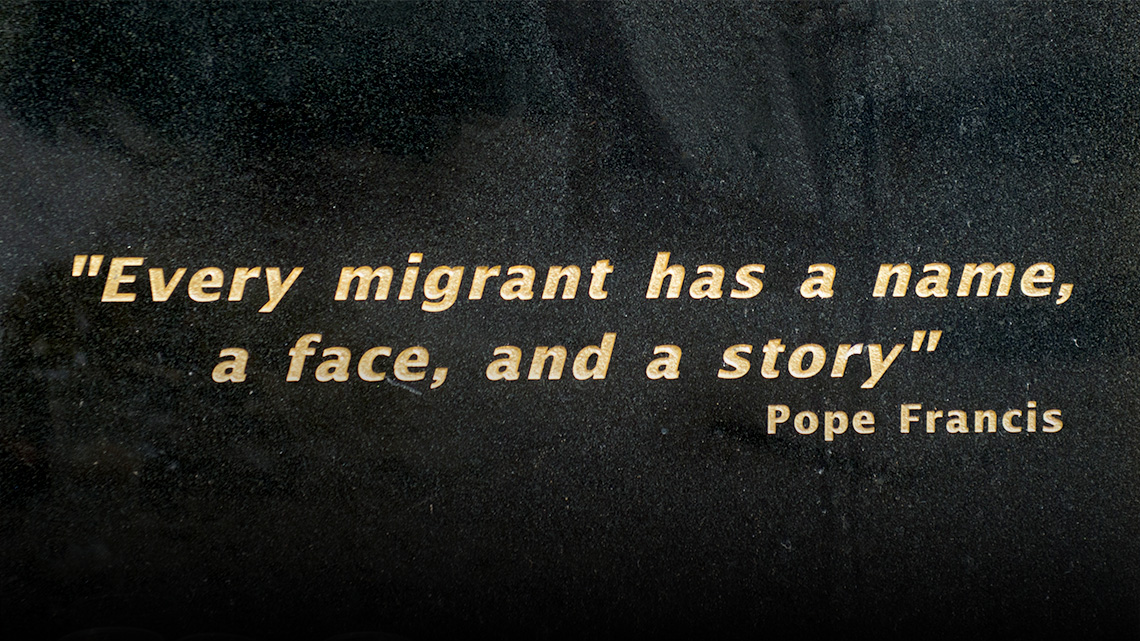Bishop Declan Lang, Chair of the Department for International Affairs, and Bishop Paul McAleenan, Lead Bishop for Migrants and Refugees provide the foreword to 'Love the Stranger'.

Love the Stranger
Scripture tells us: “Love the stranger then, for you were strangers in the land of Egypt” (Deuteronomy 10:19). The word ‘stranger’ is variously translated as ‘foreigner’, ‘immigrant’, ‘sojourner’ or ‘alien’. However, the message remains consistent: those arriving from other parts of the world are our sisters and brothers. We are called to see Christ in them, for all people are created in His image. And we are called to see ourselves in them, for we all share this common humanity.
In 2023, people making dangerous journeys across the Channel to reach the UK are also called by various names: ‘refugees’, ‘asylum seekers’, ‘migrants’, and often by more derogatory terms.
This publication by the Catholic Bishops’ Conference of England and Wales Department for International Affairs is shaped by, and articulates, our Christian duty to look beyond such labels and see the person who has left their homeland in search of a better life.
How many have died in our own waters without their names or stories ever being known? We should not reduce people to statistics or to a political problem to be solved.
Bishop Declan Lang and Bishop Paul McAleenan
When two-year-old Alan Kurdi died in the Mediterranean Sea, for a brief time politicians, journalists, and members of the public across Europe turned their attention to a person with a name and a story. Yet in the years since, how many have died in our own waters without their names or stories ever being known? We should not reduce people to statistics or to a political problem to be solved. Nor can we allow recognition of people’s dignity to be dependent
upon where they come from or how they reach our shores. The call to love in Deuteronomy is unequivocal and indiscriminate.
Such love, of course, goes beyond mere tolerance. Pope Francis reminds us that loving as Christ does means actively putting ourselves at the service of others. The Catholic community in England and Wales is living this out every day: our charities are caring for people in the asylum system, our parishes are welcoming families through community sponsorship, our aid agencies are providing life-saving assistance to displaced people across the world, and countless volunteers are bearing witness to Christ’s love in settings from beachfronts to detention centres. We hope that Love the Stranger will support and invigorate this work, for it is not an optional extra but a genuine manifestation of our faith.
As the document makes clear, loving those who seek a home here also means appreciating the fullness of their humanity. Our countries are always better off for the presence of people born elsewhere, who bring their own talents, cultures, and knowledge. Catholic parishes and schools are a microcosm of this as they have been enriched by the presence of families from all over the world. Love the Stranger challenges us to not only help those who come here, but also to facilitate and rejoice in their service to our society.
Papal encyclicals and other documents that have been drawn upon highlight the depth of Catholic social teaching in this area. This should guide our response to people who have left their homelands to come to this country. We encourage all Catholics to reflect upon how we can apply this in our own lives, as well as in our parishes, schools, and public life. In doing so each one of us may fulfil our obligation and set an example to others of loving the stranger in the way that God intends.
As we discern this, we ask for the intercession of the patron saints of migrants, and of victims of human trafficking and modern slavery.
St. Francis Xavier Cabrini, pray for us.
St. Josephine Bakhita, pray for us.
__________